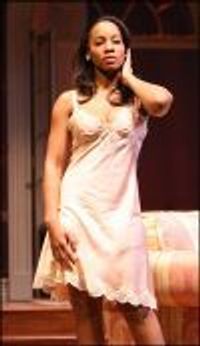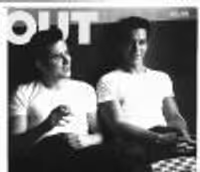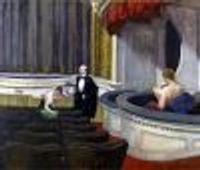On A Clear Day First Preview
#75On A Clear Day First Preview
Posted: 11/15/11 at 6:18pmOk, I had no clue "Hurry, It's Lovely up Here" was from this show. Saw Audra sing it and fell in love with the song.
#76On A Clear Day First Preview
Posted: 11/16/11 at 10:07am
"Yes, he's falling in love with her, but Bruckner realizes that Melinda's confidence and vivacity are the very things David is missing in his life in order to realize his full potential, and that gives him a reason to continue his interaction with her that isn't entirely selfish. By the end, Melinda has helped David find those gifts inside himself through Mark and, simultaneously, helped Mark find the courage to move on and embrace love again. Have they fleshed out the execution of that completely yet? No. But, conceptually, it's a beautiful touch, and I think they'll get there."
Somethingwicked, here's the thing. That was all true in the original, no? And it was all accomplished, however imperfectly, with a dual role which held the show together with the one thing it truly had going for it - star power. I think what a lot of us are saying is with the gender twisting, 1) what's gained (not that there isn't something to be gained in principle, but do they have a clear idea of what that is?), and 2) how does the decision for David and Melinda to be played by two different people relate - or not - to what they are trying to achieve?
I think I understand your point. But I don't understand how it's undermined by having the hero/heroine be played by a different actor/actress in his/her earlier life, especially since the theme you are focused on is exactly what the theme of the show has always been. Although, don't get me wrong, I'm not implying it was explored satisfactorily in its original conception and can't be improved upon. Quite to the contrary. I think what many of us were hoping is that this audacious riff in the revival would lead to elucidation of the original idea, which is the same idea you rightly identify.
Personally, I would think having Daisy and Melinda or David and Melinda played by the same person helps in that it makes the audience realize what the present day incarnation could be, that the integration of the two could be "so much more than he/she ever knew."
There are so many different ways this could have been done. And goodness knows drag isn't the only way. David could have been closeted presently and out and perhaps a drag performer in his former life (to name but one of a thousand variations, and not to suggest it was the way to go). Mark could have been gay and Daisy about to marry a gay man having been a gay man in a former life. All of these are off the top of my head and no doubt ridiculous ideas, but the fact is that gender/orientation identity play between the present and past is certainly rife with brainstorming and it seems there is an optimal route to CLEARing it through. They are on to something..... but what?
And as I've said there may well have been a good way of going with David/Melinda with two different actors as well.
Anyway, I'm babbling. I haven't seen the show yet and shouldn't. Can't help myself. Sorry.
thewaytooearlyorratherearlier
Read more: https://forum.broadwayworld.com/readmessage.php?page=3&thread=1038834&boardname=&boardid=1#ixzz1dsds4eff
Updated On: 11/16/11 at 10:07 AM
#77On A Clear Day First Preview
Posted: 11/16/11 at 10:23am
henrik, I agree with you that all of the thematic concepts I'm talking about are present in the original incarnation of the show. To answer your question, what I'm arguing is that having the gender separation in Melinda and David enhances the present ideology because it enables the distinction between their personalities to be made even deeper, which is just as important to the story as their interconnectedness. Basically, you get the best of both worlds in the way they're going about telling the story now. The other thing the new device does that drag wouldn't is that it allows David and Melinda to interact simultaneously, which I think is really powerful (especially in the context of how Mayer has staged the show.)
You're also leaving out the key component of how these things were able to be conveyed via the doubling in the original in that it was Barbara Harris playing both roles. I would argue that having the male performer playing David double in drag as Melinda cheapens the complexity of the story. It simplifies it in a way that makes it way too easy for people to view the conceit as a "gimmick." Does having a woman play Melinda make the concept more palatable, to a degree? Yes. But I'd argue that it also significantly deepens the emotional complexity of the story, which is what Mayer and Peter Parnell are going for.
I think people on this board (and elsewhere) are way off-base in arguing that the creative team is using Melinda being played by a woman to circumvent Mark falling in love with a man. That's not the point, and it never has been. They don't need to show Mark falling in love with David as a viable option because it isn't. The story is, on a bigger level, about projection- David is projecting his fear of intimacy with Warren onto the illusion of a love affair with Mark, and Mark is projecting his inability to move on from the death of his wife onto the illusion of a love affair with Melinda. In both instances, the realities of these things being accomplished are impossible (because Mark is straight and Melinda is dead,) and it is in coming to realize this that the characters are able to grow at the end of the story. For that reason, you're not losing anything by having a woman play Melinda, where as I think (for all the reasons above) you'd lose significant things if you had the actor cast as David play Melinda as a man.
Tony Kushner: You can sing it at my funeral.
#78On A Clear Day First Preview
Posted: 11/16/11 at 10:31amHaving seen this bore at Vassar and in workshop at the Vineyard, I feel I can safely say that the re-write is definitely "less than" the original in every way. It's less funny, less romantic, and less interesting. It was a case of subtracting from rather than adding to. It's trying hard NOT TO be the original, while forgetting to focus on what it wants to be. Just a bore.
#79On A Clear Day First Preview
Posted: 11/16/11 at 11:11amThanks, Somethingwicked, I really appreciate it and for the first time am seeing the the possibility of something there. Looking forward to catching the show and checking in. I am intrigued by the idea of them both on stage at the same time (City of Angelsesque) and what that might reveal.
Finch
Stand-by Joined: 9/14/08
#80On A Clear Day First Preview
Posted: 11/16/11 at 11:57amOh, well . . . I think I'm still looking forward to seeing it this weekend, anyway.
Owen22
Broadway Legend Joined: 2/24/11
#81On A Clear Day First Preview
Posted: 11/16/11 at 3:25pmI have always said, instead of rewriting the show, keep it exactly the same, just switching Daisy to David and Warren to Wanda. And of course using a Melinda actress. Just shift the directorial intentions. Make it clear, though its the 60's, that discovering Melinda in him helps David come to grips with his sexuality. That's why he says goodbye to Warren/Wanda. That there is SO much more to him than he thought there was. It gives the character a different, but powerful arc.
Gaveston2
Broadway Legend Joined: 6/28/11
#82On A Clear Day First Preview
Posted: 11/16/11 at 6:36pm
Okay, I see that--SPOILER--David decides to leave Warren to explore broader horizons. Fine.
What about Dr. Mark? What of Melinda? What are the objective correlatives that reveal the character shifts being discussed here?
Because in the original, Daisy's return to stand up to the doctor harassing her via telepathy was a clear (if comic) indicator of how she had changed. That she and Mark ended up together was irrefutable proof that the action had produced a new state of being by the end of the play.
Theatre always has at least two levels of reality: that of the narrative being told and that of the play physically unfolding in front of us. Having the same actress play Daisy and Melinda wasn't just a gimmick and wasn't just a chance for Harris to show off her mad character-acting skills. It LITERALLY made them the same woman, despite all their differences. That was a big part of the reality of the play.
In the rewrite, we are apparently TOLD that Melinda and David are the same, but in the "objective" reality, of course, they are NOT the same. This isn't automatically bad, but it is necessarily less visceral. What do the adapters do to compensate?
#83On A Clear Day First Preview
Posted: 11/16/11 at 7:17pmGaveston, perhaps they should have retitled this On A Clear Day You Can See A Double Bill Of Goodbye, Charlie and Persona?
Gaveston2
Broadway Legend Joined: 6/28/11
#84On A Clear Day First Preview
Posted: 11/16/11 at 8:39pm
LOL, henrik. I haven't thought of GOODBYE, CHARLIE in years! I saw Veronica Lake in a terrible dinner-theater production when I was a teenager. (Yes, I've seen parts of the film on TV. Debbie Reynolds, yes? It didn't seem much better.)
Re Daisy/Meinda v. David/Melinda, one of the advantages of the double casting is that both personae can appear on stage at the same time. (To me, showing different times simultaneously is one thing the stage does particularly well relative to film.) Does anybody know if the show makes good use of this potential?
Miranda3
Featured Actor Joined: 8/20/11
#85On A Clear Day First Preview
Posted: 11/16/11 at 8:47pm
Theatre always has at least two levels of reality: that of the narrative being told and that of the play physically unfolding in front of us. Having the same actress play Daisy and Melinda wasn't just a gimmick and wasn't just a chance for Harris to show off her mad character-acting skills. It LITERALLY made them the same woman, despite all their differences. That was a big part of the reality of the play.
^^^^
Well said, Gaveston! I hadn't thought of this aspect, despite appreciating Barbara Harris' performance of the two roles.
#86On A Clear Day First Preview
Posted: 11/16/11 at 9:24pmYes, Gaveston it was Debbie Reynolds in the movie (Ellen Burstyn appears as Ellen Rae Macsomething.... whatever her show biz name used to be). Years later it was quasi-remade as SWITCH with Ellen Barkin. Curiously, SWITCH also attempted to update with a gay plotline, with Lorraine Bracco making the moves on Ellen; still a mess!
Gaveston2
Broadway Legend Joined: 6/28/11
#87On A Clear Day First Preview
Posted: 11/16/11 at 9:35pm
SWITCH I know. Naked Perry King in the first few minutes--
Oops. Wrong thread.
#88On A Clear Day First Preview
Posted: 11/17/11 at 12:04amGaveston, as I said above your initial post, "The other thing the new device does that drag wouldn't is that it allows David and Melinda to interact simultaneously, which I think is really powerful (especially in the context of how Mayer has staged the show.)"
Tony Kushner: You can sing it at my funeral.
Gaveston2
Broadway Legend Joined: 6/28/11
#89On A Clear Day First Preview
Posted: 11/17/11 at 3:34pm
I'm very sorry, somethingwicked. I've been reading your posts on this subject avidly but it isn't always easy to remember details about a show one hasn't seen (i.e., I have no visual pictures to connect to the information).
Thank you for repeating the info. I realize you don't have to do so.
#90On A Clear Day First Preview
Posted: 11/17/11 at 4:27pmi didn't know Sarah Stiles was in it, i love her. And i'm sorry to hear that one little thing about the choreo, as i think Joanne Hunter is terrific...any other responses to the choreo? i'll see it if its running next time i'm there, cuz i love the leads very much....but too bad they couldn't really revise it. The trick to revisicals is not just solving the moments that inspired the new concept, but linking them together cohesively. We accept jumps in logic from older shows because of the genre. These days, we want re-writes to make much more psychological sense, and years of movies and TV hooking us on naturalism (even the rise of reality TV) makes "good old-fashioned musical comedy schtick" not work anymore.
Gaveston2
Broadway Legend Joined: 6/28/11
#91On A Clear Day First Preview
Posted: 11/17/11 at 4:50pm
I think we still accept rather large leaps of logic from musical comedies. The ending of HAIRSPRAY makes as little sense as any musical of the 1920s: why exactly is Edna in the giant can? Exhibits B and C: THE PRODUCERS and SPAMALOT.
Instead, I think a big problem CLEAR DAY always had was one of tone: it was really a musical comedy, yet it felt like a more serious musical play whenever Melinda was onstage or Mark was pining for her. And then Melinda was drowned at the climax!
From the descriptions here, it doesn't sound like that problem has entirely been solved. Those who have seen the play speak of serious themes such as grieving a dead wife, denial, projection, etc. Yet to my knowledge, Lerner and Lane never wrote an equivalently serious score.
#92On A Clear Day First Preview
Posted: 11/18/11 at 9:30am
Gaveston, you are raising some very good points about the show having always been perhaps too all over the place. There is definitely an uneven tone that a revitalized libretto would need to focus on.
But I don't think aiming high/seriously thematically is at odds with the score, highly resonant with themes of identity transformation, personal growth, loss, grief ("He Isn't You" addresses grieving a lost love brilliantly, as it simultaneously contemplates a new one), "seeing who you are," "having what you had," "coming back," "life down below [the surface]," "life up here [where it's lovely}. The soaring melodies and poetry of "(S)he Isn't You" "Come Back To Me" "What Did I Have.." and above all the title tune all go to the core of the matter. And I would imagine that the wonderful "Too Late Now [to forget the past]" could be a spot-on addition. Yes, there are several novelty or charm numbers that don't quite mesh, but that's true in almost any score.
And, as I've already gone on about at length, "Hurry It's Lovely Up Here," a song I love which seems unfairly maligned here, is not just about talking to plants. It's all about projection as it juxtaposes the heroine's (or hero's) inhibitions and inner vitality (which she is striving to get at, although she doesn't even know it), which when subtly played by an actor of supreme intelligence (Harris, if there ever was one) is a knockout introduction to what the character's journey is about. The movie uses it as a big opening title song, and situationally it is certainly challenging to imagine the scene as written working on film, but I would have loved to have seen what Streisand would have done with it in the context of the scene.
Still, however you slice it, the score is highly romantic, emotionally vivid and demands a story churning toward personal and romantic fulfillment, or, perhaps more powerfully, the moment when the protagonist finds her/himself so that such things are more than probable when the curtain comes down. The question is, how well have they succeeded?
Somethingwicked seems to suggest that they may be on to something, and I'm now more excited about seeing what it is they have done.
Updated On: 11/18/11 at 09:30 AM
#93On A Clear Day First Preview
Posted: 11/18/11 at 10:04am
The problem that you begin to identify, Henrik, is that Daisy Gamble, daffy and neurotic as she was, was also a delightful force for good - helping plants grow, trying to improve herself, being supportive to people (some of who, like Warren, didn't really deserve it). Davy Gamble, on the other hand, has no positive arc to his character or story. He is acted upon, rather than acting. Melinda, in this version, is in the same boat - she has nothing to achieve, no conflict, no character. And Mark is just glum and negative.
Remember what was enchanting about Daisy? It's all there in the original intro to the title song:
Could anyone among us
Have an inkling on a clue?
What magic feats of wizardry
And voodoo you can do?
And who would ever guess
What powers you possess?
And who would have the sense to change his views?
And stop to mind his E.S.P's and Q's
For who would ever dream of hearing phones before they ring,
Or ordering the earth to send you up a little spring?
Or finding you've been crowned 'The Queen of Lost and Found'
And who would not be stunned to see you prove
There's more to us than surgeons can remove?
So much more than we ever knew,
So much more were we born to do.
Should you draw back the curtain,
This I am certain.
You'd be impressed with you.
leefowler
Broadway Star Joined: 7/13/04
#94On A Clear Day First Preview
Posted: 11/18/11 at 12:50pm
When I saw the show, Harry Connick was very dour, as though he was upset about something...it was like his paycheck had bounced right before act one. I don't think he cracked a smile once.
Also, as a huge fan of the original cast album, I recognized only about half of the score. There are a lot of songs from other sources, and many of the songs that are actually from the original are massively rearranged, reminding me of the way the Godspell score is treated in the current revival.
Gaveston2
Broadway Legend Joined: 6/28/11
#95On A Clear Day First Preview
Posted: 11/18/11 at 2:19pm
I hear you, henrik, and I should have been clearer. As I said, the Melinda scenes (including "She Wasn't You" and the scenes of Mark pining for Melinda in the present) are musical play; it's the rest of the present that's treated as musical comedy.
When I wrote that Lerner and Lane hadn't written a musical play score, I basically meant for Daisy and Warren and the other present-day characters. I suppose "What Did I Have...?" could go either way, but when you add the dialogue around it, it seems about as serious as "Adelaide's Lament."
But for all its charms and the subtext you've outlined, "Hurry" is still a succession of puns (as you know, "the lowest form of wit") and artificial rhymes. "Cohn" is mostly the latter (compare it to "I Could Have Danced All Night").
Of course, I don't know what all they left in the trunk. Maybe there's plenty of material with which to musicalize David and his plotline, but I will be surprised.
***
But newintown identifies a much bigger problem than tone: if David and Melinda aren't active characters (or "subjects" as opposed to "objects" in the modern parlance), then what is left? An ethically dubious psychiatrist who toys with a patient not only in this life, but in the one before?
(ETA and BTW: I don't actually think comedy is less "serious" than tragedy, much less the drama of a musical play, but one has to use some word to make a distinction.)
Updated On: 11/18/11 at 02:19 PM
#96On A Clear Day First Preview
Posted: 11/18/11 at 4:30pm
"When I saw the show, Harry Connick was very dour, as though he was upset about something...it was like his paycheck had bounced right before act one. I don't think he cracked a smile once."
Lee, this makes me wonder whether Harry might have discovered before curtain that he was among the victims of the ON A CLEAR DAY Thief? (see Riedel's Colummn and related bww thread).
Updated On: 11/18/11 at 04:30 PM
Miranda3
Featured Actor Joined: 8/20/11
#97On A Clear Day First Preview
Posted: 11/18/11 at 6:42pmHenrik: The ephemeral suddenly becomes literal: "What did I have I don't have now?" My money!
#98On A Clear Day First Preview
Posted: 11/18/11 at 7:30pm
Very funny, Miranda!
ON A CLEAR DAY YOU CAN DISCOVER A THIEF AMONGST YOU
Videos







